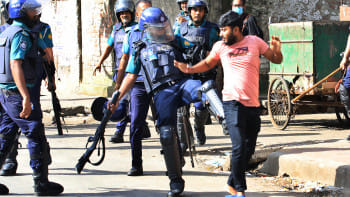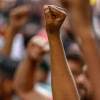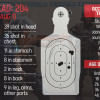We must step back from the precipice

Awami League leaders including Prime Minister Sheikh Hasina plaintively ask, "All job quota demands have been met; why, then, are the students protesting?" If the ruling party leaders don't understand or pretend not to understand why students are not staying back at home (their campuses and dormitories remain shuttered), we are in much deeper trouble than one could imagine. We are already at the precipice.
July 2024 will surely be marked as the blood-drenched July and will find its place in history with other milestones of student movement, such as 1952 (Language Movement), 1969 (Mass Uprising), and 1990 (anti-Ershad movement), which turned the tide of history.
The question frequently raised is how a demand for quota reform in government job recruitment by university students in Dhaka has been allowed to spread nationwide and to turn into a bloodbath. The common answer is that the regime has totally failed to sense the public pulse. Incompetence, arrogance, and mockery of protesters by supposedly responsible people were combined with a belief that it would be controlled by applying force and by unleashing the student arm of the ruling party. They failed to realise the depth of grief and pain of the people when Abu Sayed of Begum Rokeya University, Rangpur was gunned down by police on July 16, at close range and in public view, as he stood alone with a stick in hand. The government failed to realise that it was fast going out of hand. It failed to sit back, take stock and change its game plan.
The regime failed to see that the movement wasn't just about quotas, and the longer it continued, it conflated and merged into all the grievances and pains of the people.
Corruption and cronyism affected every citizen who came in contact with any government agency; obscene amassing of wealth by those favoured by the regime reached a new height; and the daily struggle of families to make ends meet in the face of inflation and price hikes of daily necessities was aggravated by syndicates of hoarders and extortionists nurtured and tolerated by the authorities.
They did not feel the people's pain and grief caused by more than 200 deaths of students and citizens of all ages, including children, some of whom were killed and injured in the safety of their homes by firing from helicopters roaming over residential neighbourhoods, according to the victim families' accounts.
It is very difficult to understand why student coordinators of the protest were not reached out early, in order to come to an understanding about the outcome and about a process to be followed, including handling the judicial process. The public does not understand why and how the police, Rab and border forces called in to the cities became so reckless and vengeful as to aim at the protesters' eyes and heads using not just rubber bullets, but also shotgun ammunitions and lethal bullets. In the fray, they themselves suffered attacks and loss of life. Have the rules of engagement, operational procedures and command and control broken down completely, or has this been part of the plan to subdue protest by terrorising the protesters and citizens?
The usual playbook of large-scale arrests casting a wide net and alleging vague criminal acts, picking up the people at the dead of night, not informing families of the whereabouts of those picked up, not allowing families to visit those in custody—all illegal under our constitution and laws—have continued. The regime's game plan does not require that the charges are properly framed and allegations are proven in the court. The hapless people taken into custody under any excuse would suffer harassment, physical abuse, long incarceration, material loss and mental agony, no matter what verdict the slow process of justice eventually hands down. And none are held answerable for this cruel travesty.
Considering past experiences, it is difficult to have any faith in government enquiries and the possibility of real perpetrators being punished. As the sister of 19- year -old Mahmudur Rahman Shoikot of Nurjahan Road in Mohammadpur, shot in the head as he was looking for his injured friend, asked, "Police killed my brother; should we go to them for justice?"
Students have now called for a non-cooperation movement. It is a deep expression of their frustrations. As of this writing, the prime minister has said the doors of Gono Bhaban are open to students. She has been holding meetings with university heads. These are moves that should have come much earlier.
There is no reason why the prime minister should not declare the acceptance of the nine-point demand of the students for accountability and justice regarding the government's handling of the quota reform movement and the deaths and injuries, restoring academic peace on campuses, and allowing legitimate channels of expressing students' views and complaints through elected student unions.
There is no reason why the prime minister cannot offer an unconditional apology for the mayhem caused, lives lost and how the situation has been handled by her government, despite whatever blame can be apportioned to opportunist mischief-makers.
The prime minister should demonstrate her bona fides by offering full cooperation to the Eminent Citizens' Enquiry Commission headed by Justice MA Matin and Sultana Kamal, and vow to give due consideration to its findings and recommendations.
The prime minister should ask the ministers involved in aspects of the quota reform movement to accept their share of the responsibility. Officials of law enforcement agencies need to be placed on suspension pending appropriate investigation. A process should begin to bring those respected for academic feat and personal integrity into university management.
As a gesture of good faith, the prime minister should pledge to negotiate with the UAE authorities about deporting back to Bangladesh the 57 Bangladeshis who have been sentenced to prison for holding a rally in the UAE supporting the students' movement.
The words, actions and gestures must reflect a good faith effort, signal a change of plans and strategies, and a change of heart and mind. And a willingness and openness should be demonstrated to consult and dialogue with all about overcoming the hurdles to build a just and democratic society.
No sane person can believe or declare that it is too late.
Dr Manzoor Ahmed is professor emeritus at BRAC University, chair of Bangladesh ECD Network (BEN), and adviser to Campaign for Popular Education (CAMPE). Views expressed in this article are the author's own.
Follow The Daily Star Opinion on Facebook for the latest opinions, commentaries and analyses by experts and professionals. To contribute your article or letter to The Daily Star Opinion, see our guidelines for submission.

 For all latest news, follow The Daily Star's Google News channel.
For all latest news, follow The Daily Star's Google News channel. 











Comments